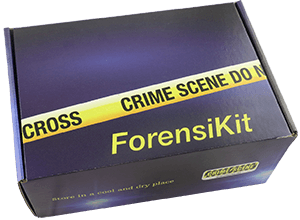
Selena Crosscroft interview
Wednesday, February 14, 2001 – 11:00 a.m.
Selena Crosscroft is Roger Hammond's girlfriend.
Detectives Armstrong and Murphy interviewed her in her office at the North Mississippi Regional Center.
The interview was recorded with the witness's knowledge and consent.
Participants:
- Detective T. Armstrong
- Detective S. Murphy
- Selena Crosscroft
Detective Murphy: We appreciate you taking the time to speak with us. Would you please state your name and address?
Selena Crosscroft: I'm Selena Crosscroft, and I live at 408 Choctaw Drive.
Detective Murphy: And your occupation?
Selena Crosscroft: I'm a social worker here at the Center.
Detective Murphy: As I'm sure you're aware, we're investigating the murder of Missy Hammond. Did you know her?
Selena Crosscroft: I saw her around town a few times. I've been in a relationship with her ex-husband for some time now, so of course I knew who she was.
Detective Armstrong: Did you ever talk to her?
Selena Crosscroft: No.
Detective Murphy: Have you ever been to the Southern Beauty hair salon?
Selena Crosscroft: No. I was aware that she worked there, and given my relationship with Roger, I just felt it would be too… uncomfortable for everyone involved. I go to La Bohéme.
Detective Armstrong: Can you tell us about your understanding of Roger and Missy's relationship?
Selena Crosscroft: When? Before or after the divorce? I guess it doesn't matter. She left him, took his daughter away from him, and now won't let him see her. Or rather, she wouldn't let him see Liddie before her death.
Detective Armstrong: Surely, as a social worker, you understand the seriousness of an Order of Protection. Are you implying that Missy was keeping Roger away just to be cruel?
Selena Crosscroft: It always sounds so clear-cut. But in real life, it's rarely so one-sided.
Detective Armstrong: What do you mean? The guy busts into their house, coked out of his mind, terrifies the woman and child, and you're saying that we're not seeing the whole picture.
Selena Crosscroft: Detective, you must realize that in divorce, one partner often accuses the other of some sort of wrongdoing in an effort to win child custody, more money, or just to hurt someone.
Detective Armstrong: But in this case—
Selena Crosscroft: Are you aware that in a 1985 study by an expert at Brandeis University in Massachusetts, it was determined that in contested divorce cases with child custody issues, almost 80% of child abuse allegations are false?
Detective Armstrong: That may be, but—
Selena Crosscroft: And a 1993 study by the Institute for the Prevention of Child Abuse found that 42% of reported cases of abuse in Ontario are false.
Detective Armstrong: But we're talking about—
Selena Crosscroft: So, clearly, hysterical allegations by a mother are not always the actual truth. Sadly enough, they're often treated as such, even though they aren't.
Detective Murphy: So I take it you weren't a big admirer of Missy Hammond?
Selena Crosscroft: Clearly not. What happened to her was a tragedy, but it still doesn't change the pain that she caused for Roger. He loves Liddie more than anything else in the world. And she kept him from her for no good reason.
Detective Armstrong: What about Roger's drug abuse? You don't think that's a good reason to keep the girl away from him?
Selena Crosscroft: First of all, Roger's drug problems are in the past. And secondly, the loss of his daughter was one of the contributing factors to escalating Roger's drug use — before he developed the tools to fight his addiction.
Detective Armstrong: Meaning?
Selena Crosscroft: When they first got divorced and he could only see Liddie for a weekend every now and then, the pain was such that he sought out chemicals to numb himself. He hit bottom right after that and got himself into rehab. Now he's clean and healthy and should be able to see his little girl.
Detective Murphy: So, to hear you tell the story, everything was Missy's fault.
Selena Crosscroft: Of course not. But she certainly contributed immensely.
Detective Armstrong: Why are you so upset about this whole thing?
Selena Crosscroft: First of all, because I love Roger. That should be obvious. And I've seen the pain that losing his daughter has caused him. And then, I'm upset in general at the way divorced dads are treated in this country.
Detective Armstrong: What way is that?
Selena Crosscroft: When a divorce is granted, the father is automatically viewed as the bad guy. I've seen it happen too many times. As a case in point, you just have to scan through the 1989 Gender Bias Study of the Court System in Massachusetts, and you'll see the statistic where the mother receives primary custody of the child 90% of the time. Are you telling me that 90% of divorced men out there are unfit?
Detective Armstrong: Whoa. OK, look, I can see that this is a major issue for you, but we should concentrate on this particular situation with Roger and his ex-wife, not focus on national statistics.
Detective Murphy: Yes, let's get back to your relationship with Roger. You've mentioned several times your love for him. Are you two serious?
Selena Crosscroft: I don't see how that's any of your business, but yes, we are very serious.
Detective Armstrong: Getting married?
Selena Crosscroft: Well, we'd like to. Someday.
Detective Armstrong: Why wait? You keep talking about how much you care for him. I assume he feels the same. What's the problem?
Selena Crosscroft: It's just not, uh, that simple. We just have to get the timing right.
Detective Murphy: How does this whole custody thing play into your timing?
Selena Crosscroft: It's an obstacle. Roger would like to get things worked out with his daughter first before he moves into another marriage. Which I can completely understand. Really, I can see exactly how he feels.
Detective Armstrong: So, if Roger had Liddie in his life, he'd marry you?
Selena Crosscroft: I didn't say it that way.
Detective Murphy: Seemed to me like you did. You said he wanted the custody situation resolved before he got married.
Selena Crosscroft: He did want to get that cleared up, but I never meant to insinuate that one would sequentially follow the other. Certainly you know that relationships are difficult and encompass many factors. It's not that simple to just say that once one thing is handled—
Detective Armstrong: Forget it. Let me ask you a simple question. What kind of car do you drive?
Selena Crosscroft: A Ford Contour.
Detective Armstrong: What color is it?
Selena Crosscroft: Sort of a wine color. Maybe you'd call it burgundy.
Detective Murphy: And where were you between 4:00 and 6:00 in the afternoon on January 26?
Selena Crosscroft: Well, I was right here, of course. I can check my schedule and give you more specifics if you'd like, but I'm here virtually every Friday afternoon. We have a regular staff meeting at that time to review the events of the week.
Detective Armstrong: Did you see Roger at all that afternoon?
Selena Crosscroft: No, he was at work then too. I didn't see him until that evening after work.
Detective Murphy: Let me ask you this. Do you have any reason to suspect that maybe Roger isn't Liddie's biological father?
Selena Crosscroft: Certainly not! He loves that child completely.
Detective Armstrong: We didn't ask you if he cared for her. We asked if he was the father.
Selena Crosscroft: I'm sure he is.
Detective Murphy: Would it change any of your opinions if, just for the sake of argument, Roger weren't Liddie's father?
Selena Crosscroft: No. He raised the girl, and I don't see why biology would matter.
Detective Armstrong: How would that affect him getting custody of Liddie?
Selena Crosscroft: It depends. Some judges might rule that he has no rights to custody. But I'm sure that wouldn't happen. That's just ridiculous! Some states even have laws that say a man has to pay child support after divorce, even if DNA tests determine he is not the biological father. So, I'm sure that any judge with half a brain would still grant Roger custody, even if Missy had some sort of paternity test done.
Detective Armstrong: Would you be willing to bet on your chances of getting a judge with half a brain? That a chance you would be willing to take?
Selena Crosscroft: Well, uh, I'm not sure what you mean.
Detective Armstrong: Never mind. I think we've got all we need for now.
Detective Murphy: Thanks for your time. We'll be in touch if we need to speak with you again.
End interview – 11:28 a.m.

